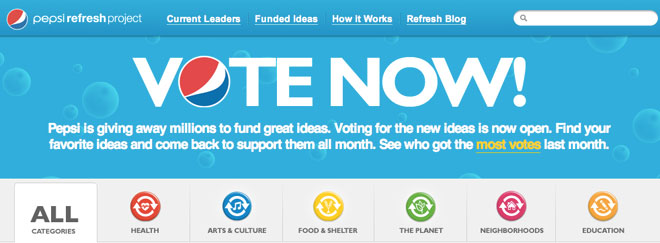Hey, remember Chase Community Giving? And Pepsi Refresh? And the American Express Members Project?
The social-media-driven, crowd-powered giving initiatives promised to “redefine corporate philanthropy” and were frothily hailed as a “taste of things to come” just a short while ago. American Express had gotten the trend started back in 2007 with the Members Project, a campaign that drew hundreds of thousands of AmEx cardholders to sign up, nominate and vote for recipients of a couple million dollars in grant funds. Chase upped the ante in late 2009, announcing a partnership with Facebook whereby nonprofits would compete for votes via the social media platform. Whoever got the most votes – and, in the process, recruited the most Facebook fans for Chase – could receive grants of up to $250,000. And Pepsi followed in 2010 by famously foregoing its traditional Super Bowl ads, spending the $20 million budget instead on a year’s worth of grants to ideas in six categories (including arts and culture), all of which would be determined by the frantic votes of fans. Shortly afterwards, American Express revamped the Members Project via a new collaboration with TakePart, a social action network linked to the hit documentaries An Inconvenient Truth and Food Inc.
All three of these and similar initiatives sought to use emerging digital technologies to devolve the power of the corporate purse to the populace, ostensibly under the banner of corporate social responsibility (but funded, especially in Pepsi’s case, primarily with marketing dollars). It wasn’t long before such contests made their way into the daily lives of nonprofit administrators, including arts organizations. As far as philanthropic innovation was concerned, it seemed like it was all anyone could talk about.
That was four years ago. If you haven’t heard anything about these initiatives recently, it’s not a coincidence. It’s because they all appear to be dead.
Pepsi Refresh seems to have had the best-attended funeral, with a well-trafficked media news site pointing out that the soda giant “let its much-vaunted social impact initiative…quietly fizzle away” in 2012.
A key factor in this shift? Business realities. While the Pepsi Refresh Project was running, Pepsi had consistently been losing market share and volume, leading to a humiliating drop to lowly third place behind Coke and Diet Coke. Add to that widespread investor pressure on CEO Indra Nooyi to focus on driving core businesses, and the handwriting was on the wall.
Members Project has gone the way of the dodo more quietly. No official announcement could be found on the web about the project’s demise, but the official TakePart website wants no part of the action, and the Facebook page it points to instead hasn’t been updated since April 2012.
Chase Community Giving’s fate is a bit murkier. The brand’s Facebook page is still active, with an impressive 3.7 million fans. But the posted content consists exclusively of fluff such as “Use your Chase debit or credit card to purchase Beyoncé and JAY Z’s #OnTheRunTour benefitting the Shawn Carter Scholarship Foundation.” The latest announcement I could find of any actual grants awarded was, again, from 2012 – a year when Chase had received reams of bad press for alleged cheating and unscrupulous behavior on the part of contestants and organizer alike. It seems likely the bank finally decided that it wasn’t worth the trouble.
So there you have it. Crowdsourced corporate philanthropy died a year and a half ago, and no one seems to have noticed. What does it mean? Well, to me, it’s a depressing reminder of the tension that exists between corporate philanthropy and corporate goals. Remember, these projects were supposed to be a marketer’s dream, tapping into the idealism and digital savvy of the Obama generation. But either that generation wasn’t that idealistic after all, or the annoyances created by the competition for votes overwhelmed any positive vibes generated by the often modest amounts awarded.
Business school types, at least the kind of folks who were in school with me half a decade ago, really want to believe that profits and virtue go hand in hand – the old “doing well by doing good” mantra. I mean, who wouldn’t love to have your cake and eat it too? Surely such opportunities exist here and there, but if you believe the efficient market hypothesis, if there were vast money-making opportunities involving grants to nonprofits hiding in plain sight, someone would be taking advantage of them already. I suspect that if corporations genuinely care about “doing good” for the world, they’re going to need to separate that agenda out from the profit-maximization mandate, as much as their shareholders might resist. On the plus side, our long national nightmare of annoying solicitations from everyone you know to vote for projects every day for a month seems to be over – for now, at least.
